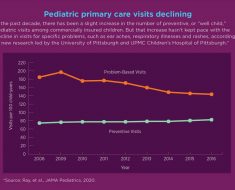Children whose families have elevated psychological and social risks, including child behavior problems, parent mental health issues, and family financial difficulties, were more likely to drop out of weight management treatment and less likely to have an improvement in weight status, according to a study published online today by the Journal of Pediatrics. The study, a collaboration between researchers at the Nemours Center for Healthcare Delivery Science and Nemours Division of Weight Management, supports the need for psychosocial screening early in the treatment of childhood obesity.
“Previous studies have found that the majority of children who receive interdisciplinary treatment in weight management clinics are successful at achieving a healthier weight. However, most weight management clinics report significant drop-out rates, limiting the number of patients who benefit from treatment,” said Thao-Ly Tam Phan, MD, MPH, a pediatrician in the Nemours Weight Management Clinic, and lead author of the study. “Given the significant impact that psychosocial risk factors seem to have on outcomes in weight management treatment, identifying and addressing parent mental health concerns, child behavior concerns, and family social resource needs upfront may help improve outcomes in children with obesity.”
The prospective study, funded by the Academic Pediatric Association’s Research in Academic Pediatrics Initiative on Diversity (RAPID) Award received by Dr. Phan, enrolled 100 families of children between the ages of 4 and 12 during their first visit to the weight management clinic. The majority of children were non-Hispanic Black (36 percent) or White (43 percent) and had severe obesity (55 percent). Researchers found that 59 percent of families had moderate to high psychosocial risk scores and 41 percent had low scores on the Psychosocial Assessment Tool (PAT), a validated screener of family psychosocial risk. Compared to data on all patients who have completed the PAT in the United States and internationally, families in this study were two times more likely to have a moderate-to-high risk score.
Each child’s progress was tracked over six months, and the study found that families with moderate-to-high risk scores on the PAT were 3.1 times more likely to stop attending the clinic. Additionally, children of those families were 2.6 times more likely to have an increase in body mass index (BMI) z-score and 3.2 times more likely to not have a meaningful change in their BMI z-score. Notably, 14 patients receiving psychological services as a component of their weight management treatment experienced lower attrition rates than those who did not (27 percent vs. 57 percent).
“These findings together highlight how important family psychosocial factors are to a child’s health behaviors and weight,” said Anne E. Kazak, Ph.D., ABPP, the co-director of the Center for Healthcare Delivery Science at Nemours Children’s Health System and creator of the PAT.
Source: Read Full Article





